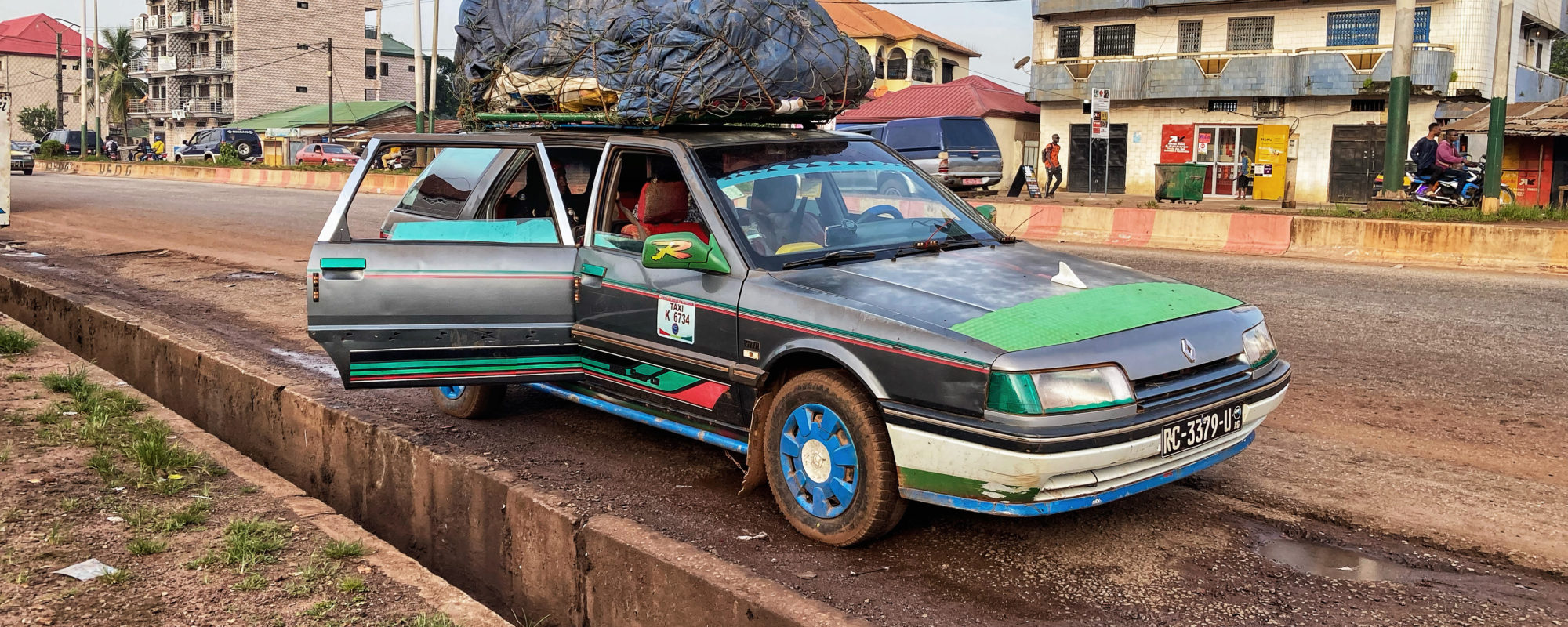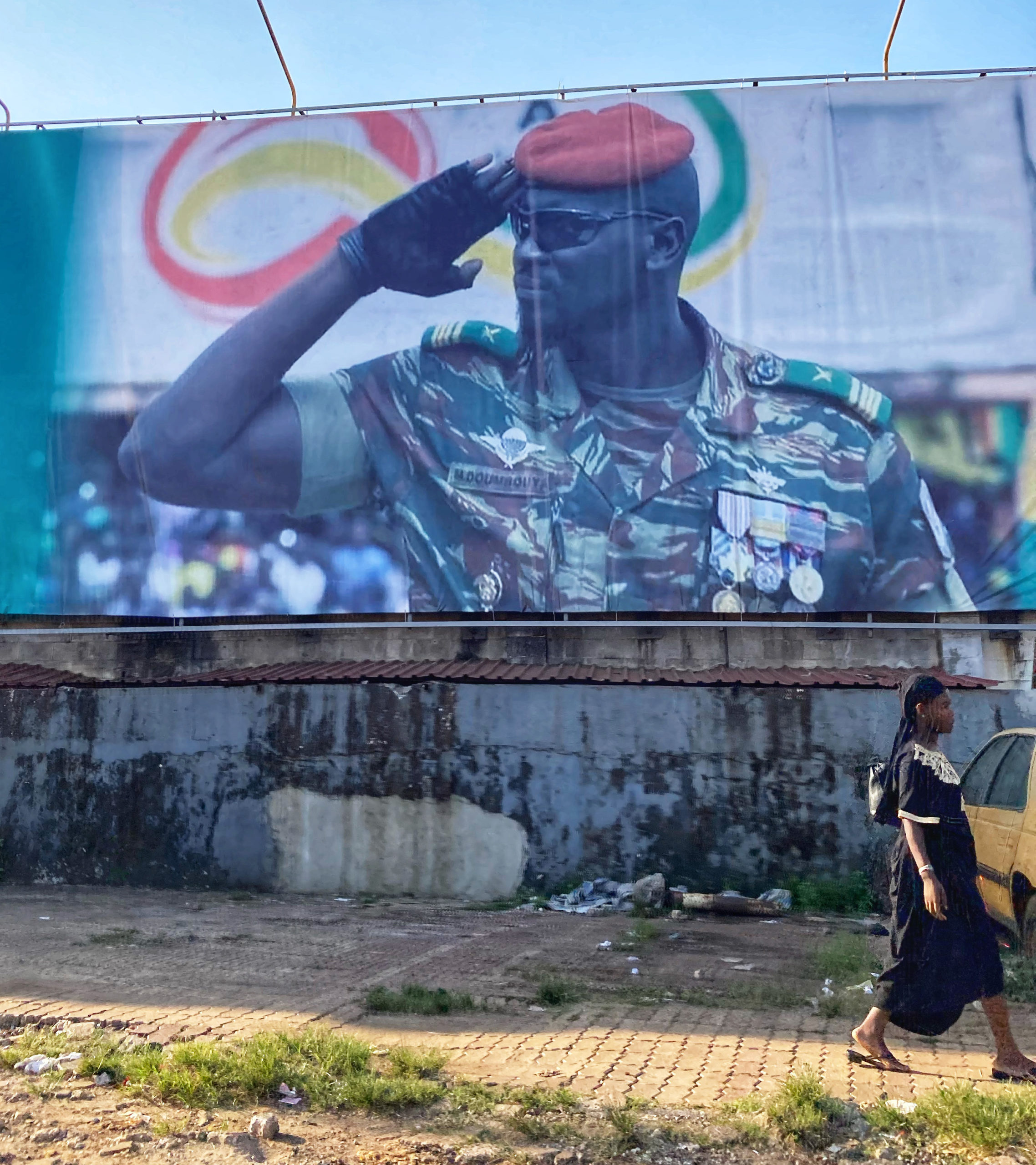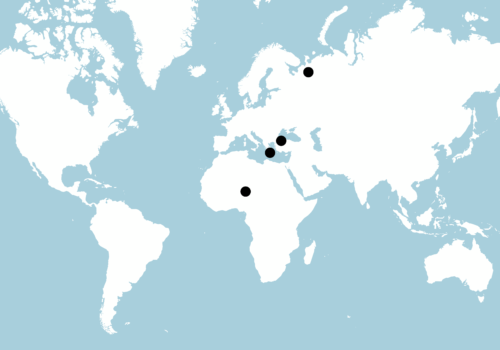CONAKRY, Guinea — As the motorcycle taxi dropped from smooth tarmac to rutted dirt road on the outskirts of Dalaba, a small town perched on the edge of the Fouta Djallon plateau, I heard the driver, named Ousman Diallo, suck his teeth. “Ngol laawol ko Diallo wiete!” (“this road’s last name is Diallo!”) I teased in Pular, the language of the Fulbe people, invoking West African last name joking relationships. “Eeeeeeeehhhh!!” he protested, mock-offended that I had associated the horrible state of the road with people with his surname. I had expected him to respond with one of the more traditional insults, calling me a thief or a bean-eater perhaps, but instead he turned his head to the side, pausing for a second as we lurched over a chunk of laterite rock buried in the road, and said “this road’s last name is… Condé!”
A month and a half earlier, on September 5, Guinea’s former President Alpha Condé—the very Condé after whom Ousman Diallo wanted to name the road—was overthrown in a coup d’etat. It was led by Colonel Mamady Doumbouya, the leader of the country’s most elite military unit, months after Condé began a controversial third term in office. Regional and global powers, which tend to view the event as a just another in a series across Africa this year, are still focused on condemning and sanctioning him and the country’s other new leaders. However, as I traveled across the Guinea in late October, I found most people—especially those who identify as Fulbe—were happy to see Condé leave, with some even expressing a little optimism that Doumbouya’s coup might represent a rare opportunity for a fresh start.
I came here at the start of my fellowship to better understand how Guineans, and specifically Fulbe, were reacting to the September 5th coup d’etat. For the next two years, I will be based in the Senegalese capital Dakar while traveling around West Africa learning and writing about the changes occurring in Fulbe societies. Known as Peul in French and Fula/Fulani in English, Fuble are a broad ethno-linguistic community of some 35 million people spread across West Africa. The Fouta Djallon highlands in Guinea are the homeland of the Pulafuta, one of the largest Fulbe groups, who make up 40 percent of Guinea’s population and have a sizable diaspora in neighboring countries. After Doumbouya’s coup, Cherif Diallo, a Pulafuta work partner from my time in the Peace Corps in southern Senegal, sent a WhatsApp message asking if I had heard the news. He sounded so happy on the phone I could almost see the edges of his lips curled in an uncharacteristic smile. But after listening to the message, I was perplexed: Why was Cherif Diallo, a Senegalese citizen who had visited Guinea only once, celebrating the coup next door?
* * *
The Republic of Guinea is a medium sized country of a little over 13 million people in West Africa. Guineans are proud heirs to the 13th-century Mali empire and the 18-19th-century theocracy in the Fouta Djallon. In 1958, following seven decades of French colonialism, Guinea’s first president, Ahmed Sekou Touré, refused Charles de Gaulle’s offer to stay in a “reformed” colonial system. The French, stung, destroyed what little infrastructure they had built and left overnight, taking anything valuable with them. While the last reliable census was done decades ago, the country’s current ethnic makeup is thought to be around 40 percent Fulbe, 30 percent Malinke and 20 percent Soussou, with the remaining 10 percent consisting of a number of smaller groups known collectively as forestière.
Guinea is well-endowed in natural resources, including the world’s second largest bauxite[1] reserves, large quantities of untapped high-quality iron ore, and significant gold and diamond deposits. But the proceeds of that bounty are enjoyed by only a small group of elites and their international “partners”—leaving the majority of Guineans in poverty.
Meanwhile, nearly 80 percent of the population is employed in agriculture, according to the African Development Bank. Despite Guinean ingenuity and good soil, a lack of industrial inputs and basic infrastructure prevents the sector from reaching its full potential. Over half the population lives in poverty while a small coterie fights for control of the state and the opportunity to control the country’s vast mineral wealth.
As my Air Senegal flight circled Conakry ahead of my arrival, I noticed that like Dakar, from where I had taken off an hour and a half earlier, Guinea’s capital is also positioned on a narrow peninsula that juts into the Atlantic Ocean, dotted with nearby islands. That is no coincidence. The modern cities of Dakar and Conkary were founded in the 19th century as the French moved their trading posts and centers of political influence from small islands off the coast to the mainland itself—displacing and coopting coastal communities as they sought closer access to their burgeoning colonial interests. Now, 60 years after independence, the cities have exploded from a small cluster of colonial buildings with their backs to the water into massive cities of 2 to 4 million residents spilling onto the mainland. While Dakar is radiating relatively uniformly out of the peninsula known as the petit-cote, Conkary’s expansion from the old colonial core, now known as Kaloum, has been constricted by mangrove swamps on either side, rendering an urban strip 24 miles long and 3.5 miles wide hemmed in by ocean and mangrove forests.
The differences between my adopted home Dakar and Conkary became even more apparent on the taxi ride from Gbessia International Airport (smaller and darker than Dakar’s sleek new Turkish-built terminal) as we swerved around potholes and dodged people sprinting across the main thoroughfare that runs down the center of the oblong city. As we approached the narrowest point of the peninsula connecting Kaloum with the rest of the city, my driver, Aziz Diallo, who was enjoying playing tour guide, pointed out two identical massive banners draped over the imposing legislative building, telling me it was called the “Palais du Peuple.” I instantly recognized Doumbouya, the new military leader, in his camo fatigues, red beret and sunglasses, striding confidently forward with a Guinean flag in the background.
Ultimately, it would be unfair to compare Senegal and Guinea. Just in the last century, the two countries experienced colonialism differently and have had radically different post-colonial trajectories. While Senegal is often referred to from outside as a bastion of political stability, Guinean politics is associated with a series of autocrats, coups and political violence.
“The Guinean people are traumatized,” Aissatou Poredaka Diallo told me, summarizing the last 50 years. Along with Babahady Marega and Cheick Camara, the two other men crammed in a small office on a side street of the downtown area Kaloum, the three are all members of the Association des Victimes du Camp Borio (Association of Victims of Camp Borio). Over the sound of a late-rainy season afternoon downpour on the roof, they described how they saw Guinea’s history of political violence as connected to impunity for previous crimes as well as a long run of poor leadership.
Through the creation of a genuinely broad-based political movement, Guinea’s first President, Sékou Touré, led the campaign to vote no to French neo-colonialism in 1958, for which he was celebrated across the country. However, over time, he grew increasingly paranoid and began using rumors of alleged and real coups[2] to arrest, detain and in some cases murder his political opponents. The epicenter of the violence was a military camp known as Camp Boiro in the heart of Conakry, where hundreds, some say thousands, of prisoners were subjected to the “diète noire”—no food or water—until they died. Aissatou Poredaka Diallo, Babahady Marega and Cheick Camara all lost loved ones in Camp Boiro.
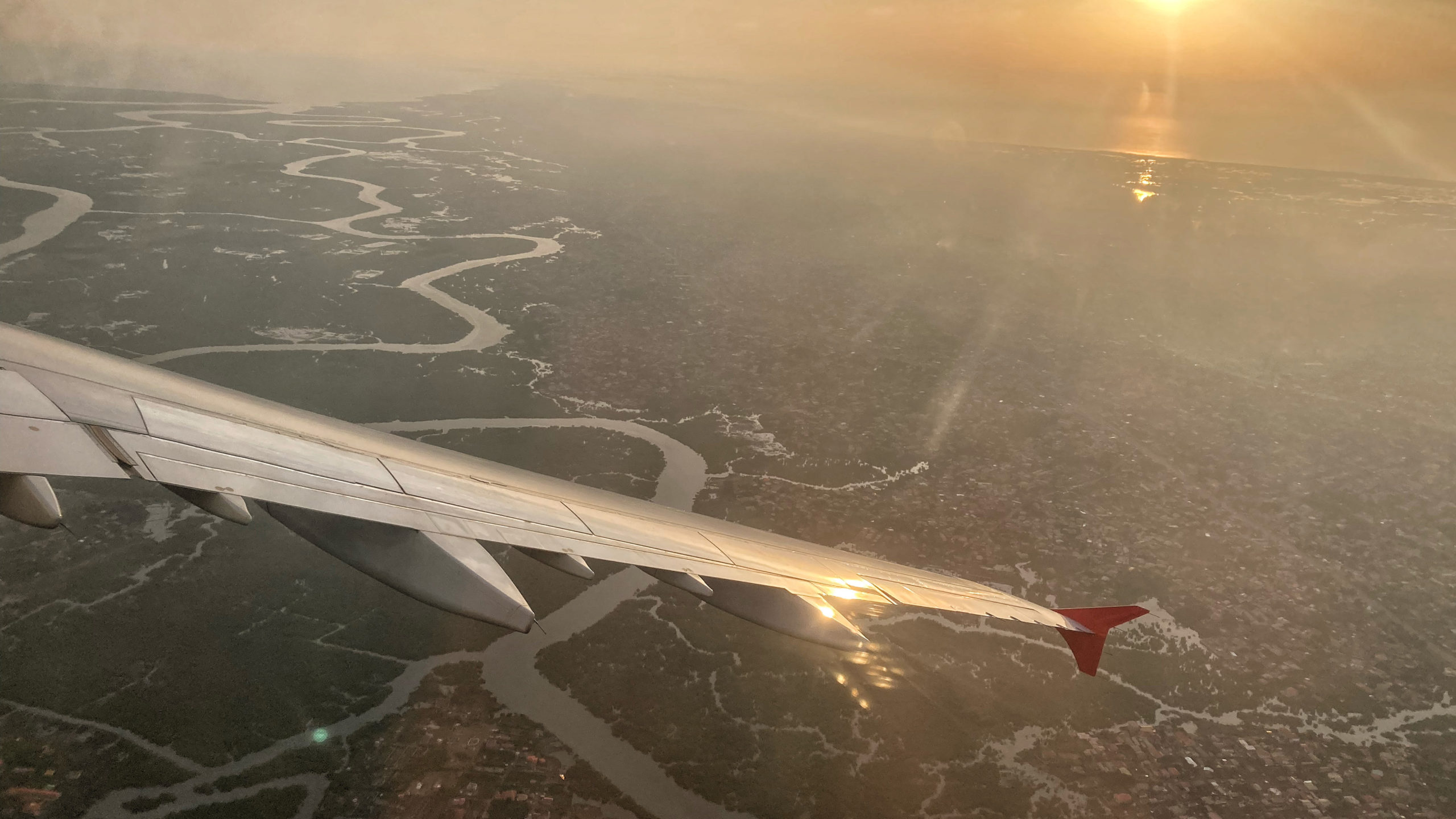
Touré died in office in 1984. A week later, a military colonel named Lansana Conté seized power. During his 24 years in office, Aissatou Diallo said, Conté did not seriously investigate the abuses under Touré, and instead built a similarly oppressive state, albeit with less acute violence. When I asked why Conté had avoided investigating past abuses, Cheick Camara, who had been sitting quietly in the corner, looked up and stated matter-of-factly: “because [Conté] and his people were among those who participated in the executions.”
“This is the problem,” Aissatou Poredaka Diallo jumped back in, eager to make her point. “Every time there is change, the new leaders protect the guilty parties and the abuses and poor governance continues.” Based on this kind of widespread analysis, one might have expected Guinean democracy activists and human rights organizations to be appalled by Alpha Condé’s violent overthrow in September. However, while quick to reiterate their disapproval of military takeovers, the vast majority of people I spoke with from Conkary to Koundara also expressed relief, even joy, that Condé had been deposed.
* * *
Alpha Condé was 15 years old when he moved to France for school. After receiving his diploma in public law from the Sorbonne, the elite Paris university, he became a professor there. But he soon migrated to opposition politics, which led to his two death sentences in absentia back home and almost four decades of exile. He returned to Guinea in 2010 to contest the country’s first free elections after a transitional period marked by the killing of 150 people, rape of 100 women and assault of over 1,200 others by soldiers in 2009 at the September 28 Stadium.[3]
Elections in 2010, held months after the massacre, became bitterly contested along ethnic lines. The main split emerged between Fulbe, who supported Cellou Dalien Diallo and predominated among the victims of the stadium massacre, and Malinke, who supported Condé. After his victory, still hotly disputed in some corners, Condé promised to be “the president of all Guineans, a president of coming together and of national reconciliation.”
On my trip across Guinea in October, however, everyone I met described how the former president concentrated economic and political power in the hands of a small clique around him, repressed the opposition with violence and generally ruled by division. But while those were widespread remarks, it is no coincidence that the people I mainly met were particularly relieved to see the end of Condé’s rule. Speaking the Pular language—which I began learning as a Peace Corps volunteer in southern Senegal eight years ago—has facilitated deeper interactions with Pular speakers than with those who speak other Guinean languages. It’s enabled me to communicate with people who do not speak French or English—disproportionately rural residents, those without formal education and women. I’m invited to more intimate spaces and can understand the conversations happening around me. It also made me a one-hit-wonder when a popular Guinean video blogger interviewed me speaking Pular in a post that raked up 25,000 views on Facebook and prompted passersby to recognize me on the street.
Although speaking French enables me to interact with a broad group of Guineans, I find that people tend to tell me things in Pular they would not say if we were speaking in a European language, especially regarding sensitive topics such as ethnicity. Fulbe in Guinea have a complicated relationship with the modern state. Historically, they are associated with the 18th and 19th-century theocracy based in the mountainous region of the Fouta Djallon that at its height had influence in places that are now in Senegal, Guinea-Bissau and Sierra Leone. Today, they are known as traders and businesspeople, from those in the corner shops selling essentials in the smallest remotest towns, to businessmen who have built trade networks across West Africa from their palatial houses perched in new suburbs above Conkary.
Under Touré, Guinea’s first president, Fulbe were denounced as neo-colonial traitors and their leaders either coopted by the regime or thrown in Camp Boiro. Thousands fled to neighboring countries, relying on networks of kinship and trade established centuries earlier. Stories from that era of the 1960s and ’70s are referred to as “painful memories” by the analyst Vincent Foucher, a researcher on West African politics at the French university Sciences Po in Bordeaux. These painful memories, some of which were experienced first-hand but stories of others manipulated over the decades, are kept alive and reinterpreted in light of contemporary political debates, heightening a real and perceived sense of Fulbe victimization.
A billboard showing coup leader Mamady Doumbouya in Kaloum
The past decade of Condé’s rule has amplified that feeling. While Guineans often use ethnicity to describe politics in private, it is taboo, especially for leaders, to speak in explicitly ethnic terms.[4] However, during tense run-off elections in 2010, Condé drew on widespread stereotypes, denouncing the Fulbe as arrogant, wealthy and “ethnocentric.” His rhetoric heightened tensions and paid off at the ballot box, where he won by combining support from his home region with enough votes from the coast and forest regions. After the results were announced, Diallo’s supporters, most of them Fulbe, took to the streets, where they were met with repressive force.
In private Fulbe look back at Condé’s decade in power as a time of rising ethnocentrism. Many people complained that his ethnic group, the Malinke, dominated his cabinet and military’s upper ranks by the end of his regime. Others described how the Malinke were given preferential treatment by political and security officials. Some also point to infrastructure spending they say was concentrated in his home region, although some of these claims have more veracity than others.
Wounds from the contested 2020 election, again between Cellou Dalien Diallo and Alpha Condé, are still fresh. Most have not forgotten that Condé began campaigning by insinuating that the Malinke would face a barrage of violence were he to lose. In the week before the election, he closed the border with Senegal and Guinea Bissau, ostensibly to prevent “foreigners”—code for Fulbe—from voting, but really to separate families and block trade in ways that disproportionally affected Fulbe he knew were inclined to vote for his opponent.
However, while Fulbe have undoubtedly suffered discrimination in Guinea, some of the examples I heard while crossing the country bordered on conspiracy theorizing. One story I heard on my 186-mile, 17-hour journey from Conkary to Dalaba particularly stretched the bounds of credulity. Apart from a passenger who made us wait two hours outside Conkary, the fact that we were 10 passengers squeezed into a car meant for seven, and that the vehicle itself was so old it had a problem with hills and needed to stop every few hours to cool down, the main reason the trip took 17 hours was the condition of the road between the cities of Kindia and Mamou. The driver Maruf Barry was forced to slow down to around 15 miles an hour (my estimate as the car’s speedometer had not worked in a decade) in order to snake around potholes that threatened to swallow us whole. Halfway through, we stopped at a mosque for the sunset prayer. While waiting for the elderly men to return from the roadside mosque, one of my younger travel companions confided in me that Condé had ordered a Chinese road crew to destroy the road just to hurt Fulbe travelling to the Fouta Djallon region. While it is true the road was destroyed by a Chinese company in order to build a new one, a quick glance at a map shows that the stretch he was referencing from Kindia to Mamou also connects Conakry with the country’s other three regions, meaning its destruction would affect the whole country, not just the Fulbe home region.
Other claims are harder to pin down. On multiple occasions, Fulbe explained to me in private that Guinea’s other ethnic groups ally against Fulbe politicians during elections because they fear Fulbe would be too powerful if they were to control both commerce and politics. While it is hard to determine the extent to which that’s true, it shows the depth of Fulbe feelings about victimization at the hands of the state and the associated loathing of Alpha Condé.
However, Abdoulaye Oumou Sow warned me from his air-conditioned office in Conakry above a noisy intersection, Fulbe grievances alone do not explain the breadth of Condé’s unpopularity across the country. Now in his early 30s, Abdoulaye Oumou Sow wears many hats, including those of independent journalist, coordinator at the civil society group L’Association des Blogueurs de Guinée (Association of Guinean Bloggers), and director of communications for the Front National Pour la Defense de la Constitution (National Front for the Protection of the Constitution, FNDC), a consortium of political parties and civil society groups formed in April 2019 to oppose Alpha Condé’s bid for a third term in office. In our hour-long conversation, he suggested Condé was unpopular across the country by the time of the coup, pointing out that there were no protests against his deposition even in areas that had previously supported him. Within his own party, Sow added, senior figures have been jostling for control instead of trying to revive “the old man.” “Alpha Condé lost his credibility when he decided to run for his illegal third term,” he said.
Indeed, Guineans were already fed up with a lack of economic development and widespread corruption when members of Condé’s party started spreading rumors about a potential third term in late 2018. Under the 2010 constitution, presidents were limited to two five-year terms. However, senior members of Alpha Condé’s political party hinted that “the people” could technically draft a new constitution and hold a referendum. To no one’s surprise, the government announced its support for drafting a new constitution in May 2019.
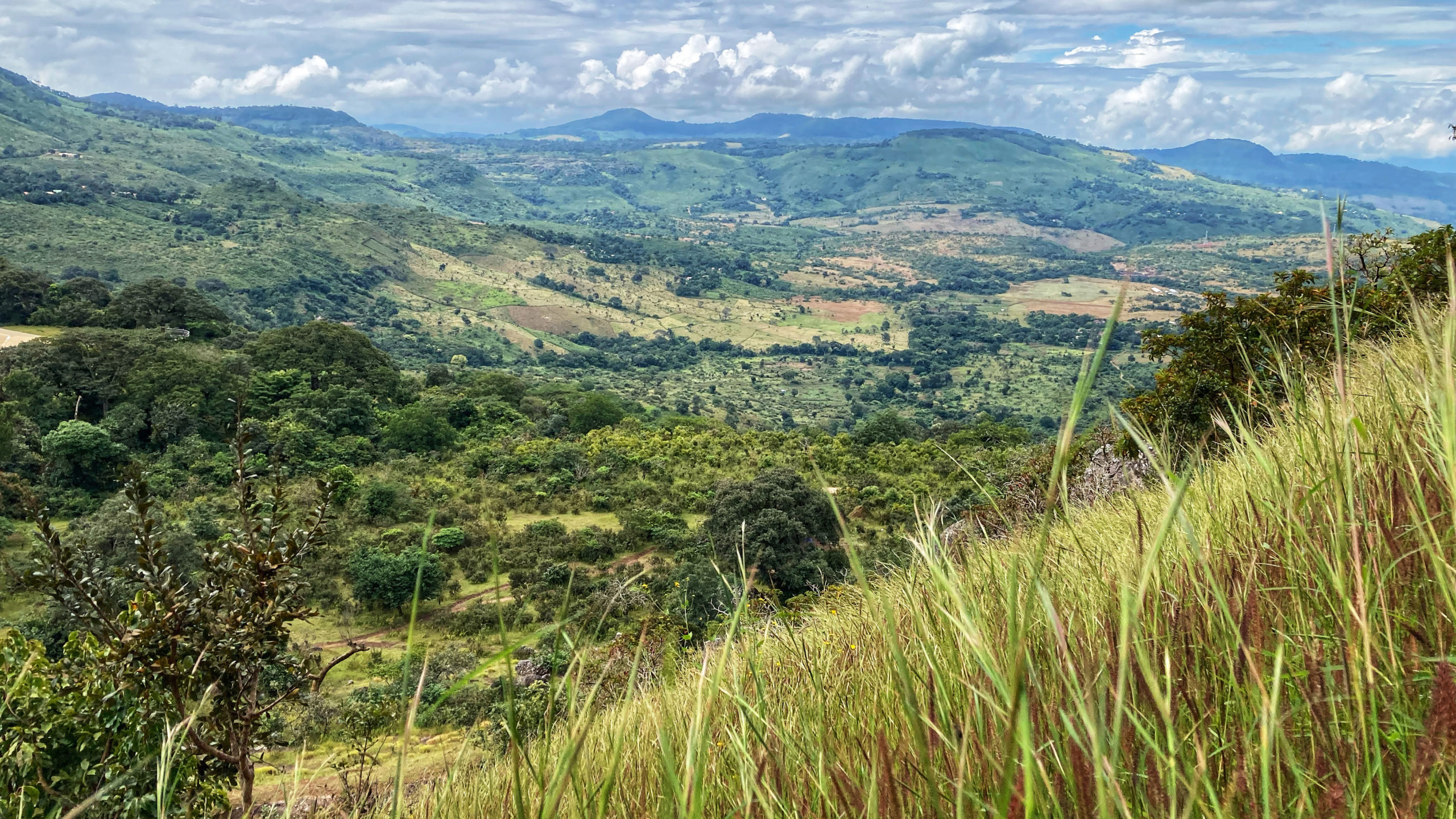
At the same time, a broad group of unions, civil society groups and opposition political parties formed the FNDC. The first protests, the FNDC’s Sow explained, were organized in the hilly city of Nzérékoré in the southern Forestiere region, far from Fulbe-dominated Fouta Djallon. Soldiers repressed the protesters, killing at least one and injuring 28 people. In early October, days before nationwide protests, the authorities arbitrarily arrested Sow and other senior leaders, which led to more outrage and larger protests over the next few months. While the referendum ended up passing, most Guineans and international observers considered the vote and its result deeply compromised by vote rigging and opposition boycotts. Condé’s legitimacy was further undermined by his repression of the opposition during the October 2020 campaign for his third term. “The real coup,” Sow told me, “was Alpha Condé changing the constitution.”
* * *
As far as the international community is concerned, however, the coup d’etat happened on the morning of September 5th when Colonel Doumbouya and a small group from his Special Forces Group attacked the presidential palace. After an hours-long gun battle in which eight soldiers were killed, Condé was captured. In opposition strongholds, thousands took to the streets in celebration. A photo of Condé lounging on a couch barefoot with one leg up dressed in blue jeans and a loose-fitting designer shirt,[5] surrounded by four soldiers in full gear and face masks, went viral on social media. That afternoon, Doumbouya appeared on television draped in the red, yellow and green Guinean flag to announce that the new leaders had suspended the constitution, dissolved the government and established the Comite National du Rassemblement et du Developpement (CNRD) to run the country.
On my first day in Conakry, I met with the veteran Guinean journalist Abdourahmane Diallo, a stout middle-aged man who enjoyed name-dropping foreign correspondents and laughing at my “Senegalese Pular.” After a homemade lunch of tori, pounded cassava with okra sauce popular among Guinean Fulbe, we picked up a friend of his and drove to a casual outdoor restaurant-bar situated under massive mango trees right by the rail line that facilitates the export of Guinea’s bauxite. As I settled into a hard-plastic chair with an ice-cold Coca-Cola, Abdourahmane Diallo look at me and began explaining that ultimately Colonel Doumbouya had launched the coup as an act of self-preservation.
After 15 years as a soldier in the French Foreign Legion fighting in Afghanistan, Djibouti, Central African Republic and Ivory Coast, Doumbouya returned to Guinea and in 2018 was asked by Condé to lead the newly formed Special Forces Group. As Condé and Doumbouya, who hail from the same hometown of Kankan, grew closer, others around the president grew suspicious of Doumbouya and began spreading rumors. As explained by Abdourahmane Diallo, and supported by outside analysts, Doumbouya likely knew his days were numbered in June of this year when Condé, acting on the advice of his defense minister, established another elite military unit to counter Doumbouya’s group.
Doumboya may have been motivated by self-preservation but he nevertheless had the support of most Guineans. Two-and-a-half weeks after the coup, he released a transitional charter spelling out four institutions that would run the country until national elections would decide a new civilian government. Although the charter made no mention of when such a vote would take place, Doumbouya forbid anyone who serves in the transitional government from running in the elections. Pointing to some of his early appointments to the military and the transitional cabinet, Abdourahmane Diallo and his friend agreed that so far at least, the colonel was entrusting the transition to an ethnically balanced group of competent technocrats.
Beyond the high politics of the transitional authorities, Doumbouya made himself popular by removing some of the frictions between citizen and state. In mid-October, he lifted the notorious ubiquitous checkpoints dotting the country’s roads. When I asked Maruf Barry, the grizzled driver during my aforementioned 17-hour journey from Conakry to Dalaba, he said the removal of the roadblocks had made everyone’s life easier. When I pointed out that I still saw him dispensing 10,000 Guinean Francs ($1) notes when we passed soldiers on the road, he countered that at least we did not have to wait around while the security services hassled all the passengers.
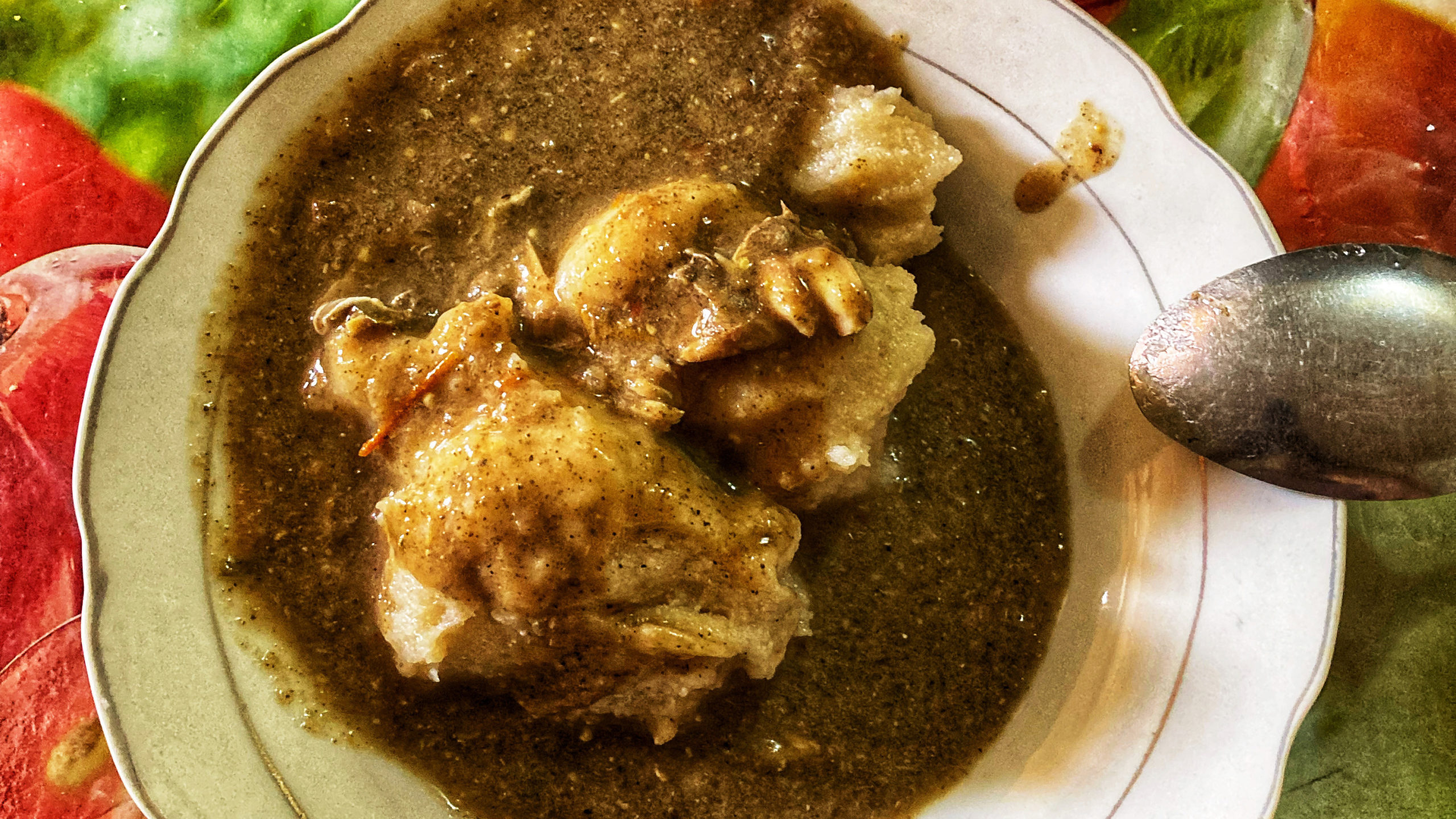
The CNRD also officially re-opened the land border to Senegal, an action with particular importance for Fulbe. The border was first closed ostensibly to stop voter fraud during the October 2020 election but the fact that it remained closed for the remainder of Condé’s rule has led many to believe it was intended to hurt the Fulbe merchants who control the lucrative overland trade networks that export Guinea’s agriculture and import manufactured goods. Maruf Barry, who also sometimes drives the route across the border into Senegal, described how, when the border was closed, it was common to see containers full of produce rotting at the side of the road. When I crossed the border myself a few weeks later, one of the border guards pointed out where the grass was shorter, where the trucks had been parked for months.
I was surprised by the cautious optimism expressed by the civil society leaders I spoke to. Asmaou Diallo, the founder and president of l’Association des victimes, parents et amis du 28 septembre (Association of Victims, Parents and Friends of 28 September) is in her early 60s and clearly a force of nature when it comes to organizing and activism. When, in their office in Conakry, I asked her reactions to the coup, she told me that initially she did not feel optimistic. Her suspicion of the military leadership stemmed from the fact that the 2009 stadium massacre, in which her son Ali, 33 at the time, was killed, happened during a transition overseen by the military authorities. However, she countered, “the first discourse the colonel gave us he spoke about justice.”
In his first few weeks, Doumbouya made simple but important gestures that acknowledged some of Guinea’s “painful memories”—a step Condé never even attempted in his decade in power. On September 27th, the colonel visited the Bambeto cemetery, where the victims of the stadium massacre and Condé’s other crackdowns are buried. The next day, he went to the Stadium of 28 September to honor the massacre’s 12th anniversary. The transitional authorities allowed a commemoration led by the Victims of Camp Borio Association, which had been banned the last two years, and even sent a representative.
Asked how they saw their roles in the transition, Asmaou Diallo and Aissatou Poredaka Diallo, both of whom work with victims’ groups from different traumatic moments in Guinean history, responded separately that they saw it as their job to push the authorities to turn this “discourse” into action. “There already was an investigation of the September 28 Massacre with recommendations,” Asmaou Diallo pointed out, “but Alpha Condé did not even read it. The new authorities can start by looking at that, they already have the foundation there.”
While Guinean activists continue to express optimism about the coup’s effects, the event has been viewed in West African and Western capitals as part of a “contagion of coups” this year including in Chad in April, Mali in May, Guinea in September and Sudan in October.[6] To deter further coups, the regional group Economic Community of West Africa States imposed sanctions on Guinea’s new leaders and the United States took Guinea off the Africa Growth and Opportunities Act which technically deprives Guinea of preferential access to the American market. While the real effects of those measures are disputed, they strike most Guineans as unhelpful at best and counterproductive at worst. “What did the outside world do,” Abdoulaye Oumou Sow asked, “when Alpha Condé shot people in the street to have his third term?”
* * *
Despite the general optimism in Guinea, everyone recognizes that political transitions are often times of uncertainty when the risk of violence rises. While Doumbouya is retiring Condé loyalists from the military, depoliticizing the security sector will be a long and fraught project. Based on Guinea’s previous history, there is a chance the elections concluding the transition will be accompanied by intensified ethnic politicking. It may be tempting to read the iconography around Kaloum as a sign Doumbouya is trying to establish cult of personality, but a number of people believe that an elite soldier’s pledge not to run for office after the transition is “sacred.” When pushed, activists such as Asmaou Diallo and Abdoulaye Oumou Sow repeat that Guineans “have opened their eyes” and would take to the streets if Doumbouya starts to position himself to stay in power beyond the transitional period. However, civil society groups have already voiced disapproval about the appointment of figures associated with Condé’s government to the new transitional authority.
Wherever it goes, the political transition is just beginning. Right before publishing this piece I called Cherif Diallo, my work partner from the Peace Corps, whose enthusiasm had worn off. He admitted that much could still go wrong. As I spend the next two years exploring the changes occurring in Fulbe societies across west Africa, I expect to return here to follow them. Who knows, maybe next time I am in Dalaba, the motor-taxi drivers will jokingly refer to their potholed roads as “Doumbouya.”
Top photo: The neuf-place (nine-seat) Peugeot 504 that made the 17-hour journey from Conakry to Dalaba
Endnotes
[1] A kind of rock that is the main source of the world’s aluminum.
[2] Notably an attack by Portuguese colonial forces on Conakry in November 1970 to eliminate the rear base for Bissau-Guinean independence fighters.
[3] Named for the date Guinea voted to reject French colonialism under Sekou Touré.
[4] Even in my interviews in Guinea, I noticed a difference in how people spoke about ethnicity depending on whether I was recording the conversation.
[5] The shirt itself became the butt of the joke on West African social media when it was pointed out that Laurent Gbagbo, the former leader of Ivory Coast, was wearing a similar design when he was taken into custody by the French military in 2011. See: https://twitter.com/DaliBemba/status/1434813367852703747?s=20
[6] Although there has been far less international criticism of the coup in Chad, perhaps partly because it was explicitly supported by the French government.

